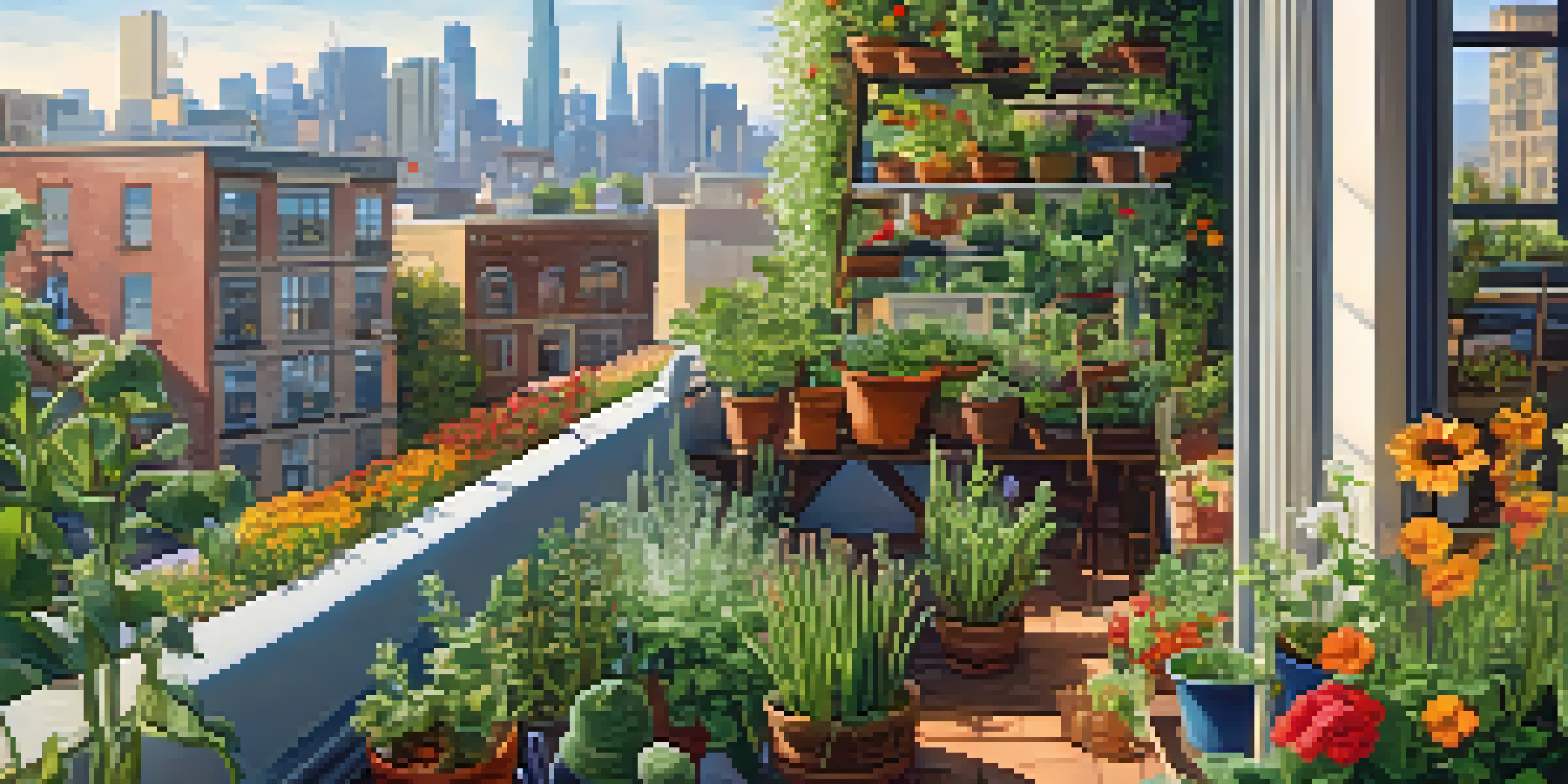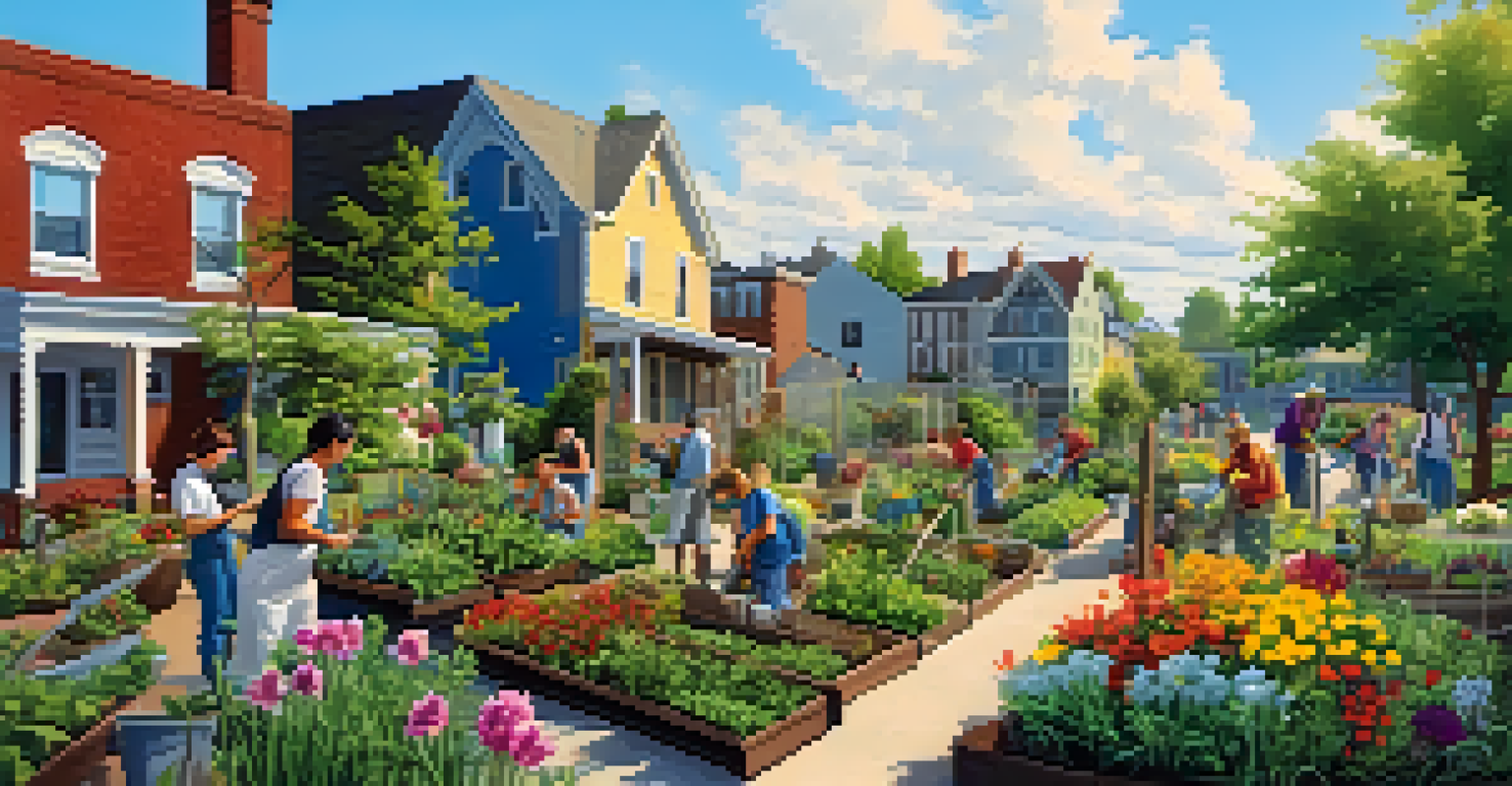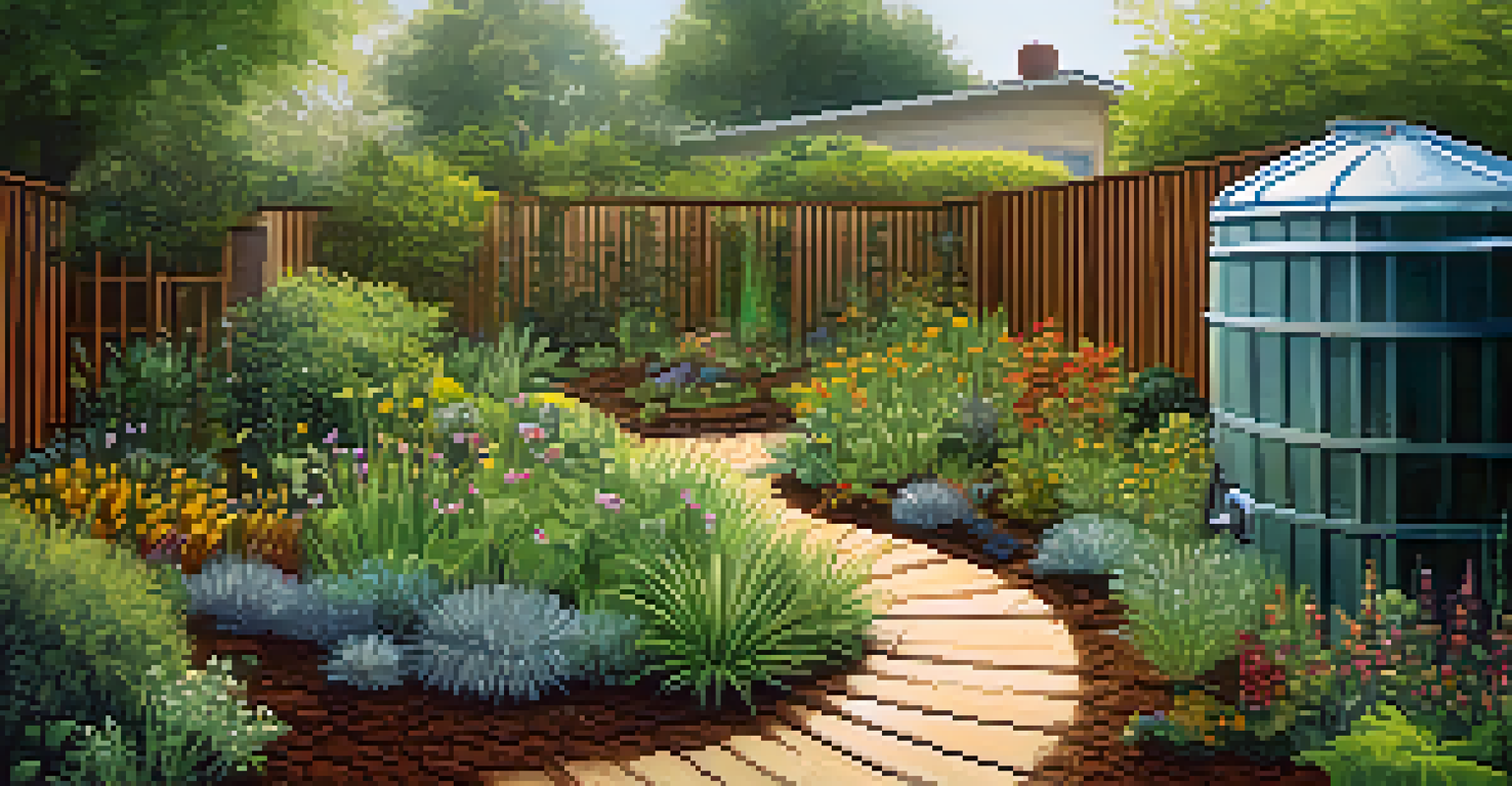The Benefits of Sustainable Gardening for Urban Environments

Understanding Sustainable Gardening in Urban Areas
Sustainable gardening is all about growing plants in ways that are eco-friendly and resource-efficient. In urban settings, where space is often limited, this approach encourages the use of local resources and minimizes waste. By adopting sustainable practices, city dwellers can contribute to a healthier environment right from their backyards or balconies.
The greatest threat to our planet is the belief that someone else will save it.
This method embraces techniques like composting, rainwater harvesting, and organic pest control, which not only enhance plant growth but also promote biodiversity. Imagine transforming a small patch of concrete into a lush garden that attracts bees and butterflies! It's a win-win for both nature and urban residents.
As cities continue to expand, integrating sustainable gardening can help mitigate some of the challenges associated with urban living, such as air pollution and heat islands. By greening our urban spaces, we can create a more vibrant ecosystem that benefits both humans and wildlife.
Enhancing Urban Biodiversity through Gardening
One of the most significant benefits of sustainable gardening is its ability to boost urban biodiversity. By planting a variety of flowers, herbs, and vegetables, gardeners can provide habitats for different species. This not only makes the environment more beautiful but also supports the local ecosystem by attracting pollinators like bees and butterflies.

Urban areas often lack green spaces, which can lead to a decline in the number of species that thrive in those environments. By cultivating diverse plant life, we can create pockets of greenery that serve as essential refuges for wildlife. Think of it as building a mini-ecosystem right in the heart of the city.
Boosting Urban Biodiversity
Sustainable gardening enhances urban biodiversity by providing habitats for various species, supporting local ecosystems.
Moreover, increased biodiversity helps with pest control and disease resistance. When you have a mix of plants, it naturally reduces the chances of pests overwhelming a single species, which means less reliance on chemical pesticides. This creates a healthier environment for everyone.
Improving Air Quality and Urban Heat Management
Sustainable gardens play a crucial role in improving air quality in urban areas. Plants absorb carbon dioxide and release oxygen, effectively cleansing the air we breathe. A well-planned garden can help counteract some of the pollution generated by vehicles and industrial activities prevalent in cities.
Nature does not hurry, yet everything is accomplished.
Additionally, green spaces can help mitigate the urban heat island effect, where city areas become significantly warmer than their rural counterparts. Plants provide shade and release moisture through a process called transpiration, which cools the surrounding area. Imagine walking through a shaded garden on a hot summer day instead of baking on concrete!
By incorporating more greenery into our urban landscapes, we can create a more comfortable living environment. This simple act of gardening can lead to significant improvements in our overall well-being and quality of life.
Promoting Mental Well-Being and Community Connections
Gardening, especially in urban settings, can have a profound impact on mental health. Engaging with nature has been shown to reduce stress, anxiety, and depression. Just think about how calming it feels to be surrounded by greenery and fresh air—it's a natural mood booster!
Moreover, sustainable gardening can foster a sense of community among neighbors. Community gardens, for example, allow people to work together, share resources, and learn from one another. These communal spaces become hubs of social interaction, bringing people closer and building lasting friendships.
Improving Air Quality
Gardens help cleanse urban air by absorbing carbon dioxide and releasing oxygen, contributing to better air quality.
As we cultivate our gardens, we're also cultivating a sense of belonging and purpose, which is vital for our mental well-being. The simple act of planting seeds can grow into something much larger—a thriving community that supports each other.
Reducing Food Deserts with Urban Gardens
In many urban areas, access to fresh, healthy food can be a challenge, often leading to what are known as food deserts. Sustainable gardening offers a solution by enabling city dwellers to grow their own fruits and vegetables right at home. This not only improves access to nutritious food but also empowers individuals to take control of their diets.
Community gardens play a significant role in alleviating food insecurity. When neighborhoods come together to create shared gardens, they can collectively produce a bounty of fresh produce. It's a powerful reminder of how collaboration can yield abundant results, making healthy food accessible to everyone.
Moreover, growing food locally reduces the need for transportation, which in turn lowers carbon emissions. By choosing to cultivate gardens, urban residents can contribute to a more sustainable food system while enjoying the benefits of fresh produce right at their fingertips.
Conserving Water with Sustainable Practices
Water conservation is a critical concern, especially in urban areas where demand often exceeds supply. Sustainable gardening practices, like using native plants and rainwater harvesting, can significantly reduce water usage. Native plants are adapted to local climates and require less water, making them an excellent choice for eco-friendly gardens.
In addition, techniques such as drip irrigation and mulching can help retain moisture in the soil and minimize water waste. Picture a garden that thrives with less watering—it's not just a dream; it's entirely achievable with sustainable practices!
Fostering Community Connections
Community gardens promote social interaction and collaboration among neighbors, strengthening community ties.
By prioritizing water conservation in our gardening efforts, we can help protect this precious resource while still enjoying the beauty and bounty of our gardens. It’s a small change that can make a big difference in our environmental footprint.
Inspiring Future Generations through Sustainable Gardening
Sustainable gardening is not just about the present; it's also about inspiring future generations. When children are exposed to gardening, they learn valuable lessons about responsibility, patience, and the importance of caring for the environment. Imagine a child planting a seed and eagerly waiting to see it grow—it’s a lesson in the cycle of life!
Schools and community programs that incorporate gardening can instill a love for nature and sustainability in young minds. By encouraging hands-on experiences, we can teach children the benefits of growing their own food and the impact of their choices on the planet. This knowledge empowers them to make informed decisions as they grow.

Ultimately, by fostering a culture of sustainable gardening, we can create a generation that values and prioritizes environmental stewardship. It's a legacy that goes beyond our gardens, ensuring a healthier planet for years to come.